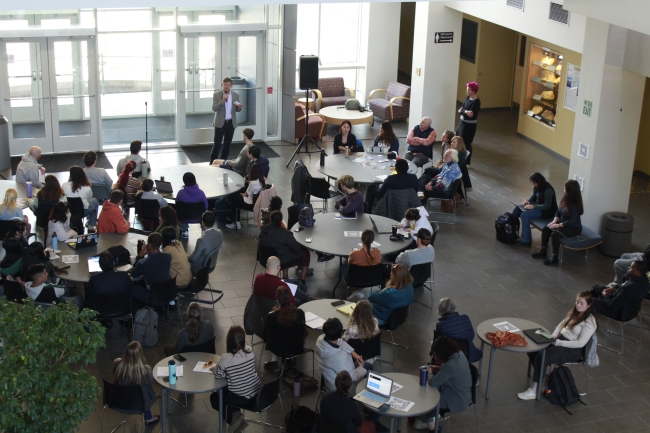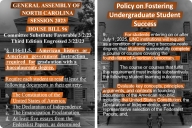You have /5 articles left.
Sign up for a free account or log in.

Tim Leslie, executive director of Impact Beloit, shares with the campus community Beloit College's plan to launch two new schools to strengthen career development.
Beloit College
A March survey by Gallup found students enrolled in bachelor’s degree programs were more likely to say their degree was worth the cost if they felt it prepared them for life after college, but a global survey by Go1 found only around 25 percent of employees believe higher education best prepared them for their role.
To support students as they imagine their lives after graduation, Beloit College is expanding professional development programming formally into its academic schools, expanding on a collegewide initiative, Career Channels.
First up are the School of Business and Entrepreneurship and the School of Health Sciences, which launched officially with the inauguration of President Eric Boynton in November, with plans to add a School of Media and School of Sustainability by next fall.
Lost in the current: Beloit launched Career Channels in 2019 to address the perception that liberal arts colleges don’t prepare students for the job market, explains Tim Leslie, vice president for career and professional development.
“We saw the need to address the growing concern in the marketplace, which is namely prospective students and their parents, about this concern of ‘Is my child going to get a job if [they] go to a liberal arts college?’” Leslie explains.
Career Channels, in turn, make learning outcomes that are common in a liberal arts education (including creative problem solving, effective communication and collaboration) more explicit and tied to career paths.
Channeling ideas: At present, Beloit offers eight Career Channels: arts, business and entrepreneurship, curating and communication, health and healing, justice and rights, sustainability, world building and sports, and fitness and recreation.
Summer working groups led by faculty and staff members pulled insights from Beloit alumni to unify curricula with outside-the-classroom experiences, “infusing the ethos of a liberal arts college” with career development, Leslie says.
Flowing through channels: When a student is admitted to Beloit, a faculty member reaches out to them within 48 hours to establish a mentoring relationship. “The purpose of that is to immediately make a connection with the student to find out what they’re interested in,” Leslie explains.
First-year students take an introductory class within the advanced mentoring program (AMP), taught by a faculty adviser, to help learners connect with their peers, explore campus offerings and find their vocation.
During those classes, staff in career development roles talk to students about Impact Beloit and Career Channels, and they encourage them to be exploratory.
“We discourage any notion that you need to decide what your career is—that’s not what this is about,” Leslie says. “There’s, as we see, too much emphasis on that, and the emphasis is instead on ‘what do I have an interest in?’”
The channels are designed to be broad and encompass a variety of industries and roles. The eight channels embody most of the experiences available at Beloit while referencing some of the areas where the college has expertise—for example, the curating and communication channel draws on the college’s multiple museums on campus.
Each channel has suggested courses, campus activities, student work and internships as well as off-campus opportunities to help guide students.
Suggested courses cover many disciplines—the business and entrepreneurship channel features media studies, dance, anthropology and political sciences classes, as well as economics and philosophy.
Campus activities could be student organizations, professional networks or events related to their interests, and off-campus opportunities pull jobs and volunteer positions from the surrounding community, as well as relevant study away programs.
What’s new: The expansion of channels into formal schools is one element of Impact Beloit, an institutional initiative to ensure that college education has a lifelong impact on students, Leslie explains. Impact Beloit, officially launching in fall 2024, will incorporate career and work experiences within the curriculum and student experience.
The goal is to combine specialized knowledge and skill alongside liberal arts learning and career preparation at the curricular level.
Alumni relations will be a critical piece of Impact Beloit, drawing on the college’s 15,000 alumni and their networks, as well.
How is your institution incorporating career readiness into the curriculum? Share with us.








